]]>

It is a part of the heart that most people have never pondered, let alone heard of, in their lives. But the left atrial appendage – a physical trait that all humans share – is worth knowing about because it is involved in the vast majority of strokes. Now, a prestigious new grant obtained by a team from the USF Health Morsani College of Medicine and Tampa General Hospital could significantly enhance preventive treatments.
Thanks to the innovative work of Dr. Hiram Bezerra, professor at the USF Health Morsani College of Medicine and director of the TGH Interventional Cardiology Center of Excellence, the $460,000 grant could lead to key improvements of an existing procedure to block the opening to the left atrial appendage (LAA) in certain patients who are at high risk for stroke. And it ultimately could deliver safer, faster, and more effective results for patients.
This marks the first time a National Institutes of Health R01 grant – designed to support advanced, hypothesis-driven research projects with strong preliminary data – has been awarded to USF Health’s Division of Cardiology Sciences in the Morsani College of Medicine.
“I think this is reflective of the journey we are on to become a national presence in the forefront of cardiology,†said Dr. Guilherme Oliveira, chief of the division and Ed C. Wright Professor and Chair of Cardiovascular Research, as well as co-director of the USF Heart Institute for Research. Dr. Oliveira also is vice president and chief of the Tampa General Hospital Heart & Vascular Institute.
“This has never been done here before – the ability to get an R01 grant for our division that basically is developing a new technology – with potential clinical applications going all the way from basic pre-clinical engineering of an innovation and taking it all the way to the bedside,†said Dr. Oliveira. “And I think it’s very telling of where we are with the type of talent we’ve been able to attract to USF and Tampa General.â€
In this case, the grant, three years in the works, will allow Dr. Bezerra and his team to produce a better, more streamlined approach for dealing with the left atrial appendage – an area in the heart’s left atrium akin to a little pocket. While the structure may help lower pressure in the atrium, it also is possible for blood to pool there in patients with atrial fibrillation, a type of irregular heartbeat, and raises the risk of a clot that could travel to the brain.
“The actual magical aspect of it, and what we are trying to achieve, is a therapy that is offered for stroke prevention,†said Dr. Bezerra. “More than 90 percent of strokes originate from the left atrial appendage chamber. And by occluding the left atrial appendage, you will prevent a stroke in a population prone to have one – the atrial fibrillation, or AFib, population.â€
Those suffering from AFib experience an array of symptoms that include an irregular heartbeat, a racing heart, shortness of breath, fatigue and chest pain. People with the condition are some five times more likely to suffer a stroke than those without it – with some 12 million in the U.S. estimated to have AFib by 2030.
“The patients we are targeting have AFib and for some reasons are not a good candidate for the standard preventive therapy of blood thinners,†Dr. Bezerra added. “The next treatment in line is occluding the left atrial appendage. And we are talking about hundreds of thousands of patients in the United States.â€
The primary device in the U.S. used to block the left atrial appendage is called the Watchman, manufactured by Boston Scientific, with some doctors employing the Amplatzer Amulet heart device from Abbott. In the current protocol, a patient typically receives a transesophageal echocardiogram two weeks ahead of the procedure to examine the structure and functioning of the heart and evaluate the size of the appendage.
This allows doctors to plan the procedure and select the device. Patients commonly receive general anesthesia for the procedure, which again involves a transesophageal echocardiogram as a real-time guide. In most cases, patients return home the next day.
“But we are pushing to implement a workflow that is less resource intense, and that we believe is actually safer to do,†Bezerra said.
The grant proposed that patients will not have to undergo general anesthesia for the procedure, and a single cardiac MRI would be employed, allowing a patient to just come in once and not have to undergo a separate pre-imaging appointment. The scanner on the day of the procedure would perform the sizing to determine the best device to use. And it would also allow for improved visibility in real-time guidance during the procedure – providing live, higher-resolution images than the current method affords.
“It will all be done with a single modality,†Dr. Bezerra explained. “In addition, the patient is awake. There is no additional cost of the intracardiac echo, or the inconvenience of general anesthesia. And it increases the chances of a patient to go home the same day.â€
Dr. Bezerra wrote the grant to be tied specifically to the Watchman because it is more frequently used. But ultimately, replicating the procedure on a different device would not be difficult to achieve. The grant includes a pre-clinical stage at Cleveland’s Case Western University followed by a clinical phase at USF Health and Tampa General. He estimates that it could be available for use on USF Health patients at TGH in three years.
“The plan is for me now to make a few trips to Cleveland, when it’s time for the animal experiments and to help facilitate that,†Dr. Bezerra said. “The next step will be testing for MRI compatibility and starting basic engineering work. A lot of bench and pre-clinical work still needs to take place before we can offer it to patients.â€
Dr. Oliveira put it in perspective: “This is the holy grail of grants – where you go, as I said, from a bench concept and have a grant that will support the development of that product all the way to the bedside. It is not easy to do outside of the industry.â€
The research also will be a natural fit for work that other physicians, such as Dr. Bibhu Mohanty, already are doing at USF and TGH to advance stroke care, Dr. Bezerra said. Dr. Mohanty, an associate professor in Internal Medicine at the College of Medicine, is an interventional cardiology specialist.
“This grant will complement our very active multidisciplinary neurocardiac program led by Dr. Mohanty in close collaboration with Neurology and Electrophysiology,†Dr. Bezerra said. “With the addition of this translation grant, USF/TGH will continue to be on the very cutting edge of stroke prevention.â€
Story by Dave Scheiber for USF Health News.
]]>
]]>
The targeted growth will help extend the reach of the academic medical center into national spotlight.
In just over eight months, Guilherme Oliveira, MD, MBA, has reimagined USF Health’s cardiovascular program and established the foundations of a new cardiovascular institute – a collaboration of the USF Health Morsani College of Medicine (MCOM) and Tampa General Hospital (TGH).
“It’s been a busy year,†Dr. Oliveira said. “And there’s much more to come.â€
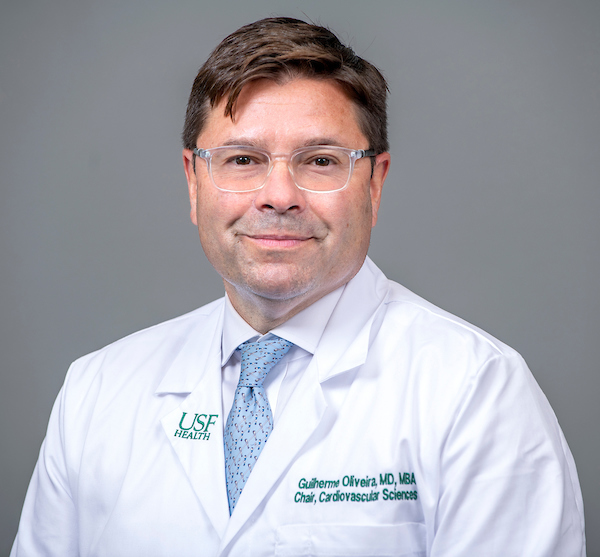
Dr. Guilherme Oliveira
Dr. Oliveira joined USF Health in January 2020 as chief of the Division of Cardiovascular Sciences in MCOM and director of the USFH/TGH Heart and Vascular Institute (HVI), as well as associate director of the USF Health Heart Institute, dedicated to research.
Effectively, he serves as the executive responsible for the entirety of the heart services at USF Health and TGH, a position that provides the opportunity to redesign patient care, strengthen the scientific mission, and elevate the reputations of USF Health and TGH as national leaders in cardiovascular care.
“By redesigning our overall operations and expanding our areas of expertise through recruitment of talented physicians, we are developing greater depth and breadth in every aspect of our mission as an academic medical center: clinical care, research and education,†Dr. Oliveira said. “This all-encompassing approach will not only result in improved patient care and outcomes, but also stronger collaborative research and discovery, putting a national spotlight on our entire program.â€
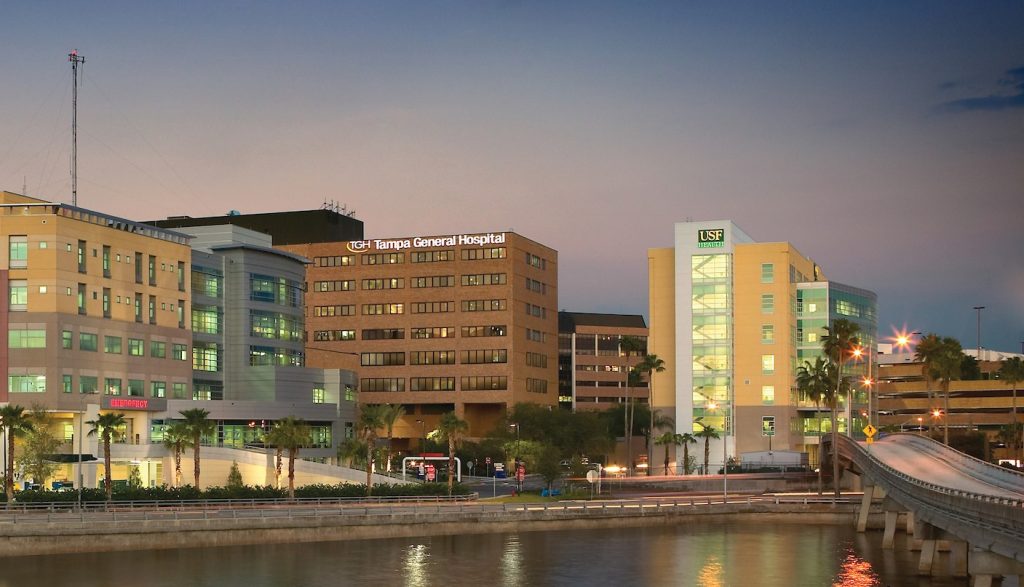
USF Health and TGH have coordinated cardiology efforts for many years and the collaboration has led to significant gains in national rankings – TGH just earned a #1 ranking in Florida by U.S. News & World Report for cardiology and heart surgery, programs led by USF Health faculty with full TGH support.
Designing a framework for comprehensive care and quality education
One of the first steps on the academic and clinical sides, Dr. Oliveira said, was to create dedicated specialty sections within the MCOM Division of Cardiovascular Sciences, which include electrophysiology, interventional, imaging, heart failure, education, and general cardiology/prevention. Careful growth in all sections is the plan, he said, but the general cardiology section will see the biggest push because of the ever-growing demand by patients for general and preventative heart care, especially among women.

“Our general cardiology program needs to meet patient demand and that includes adding a stronger focus on women’s health and prevention,†he said. “We are also taking advantage of our faculty expertise and establishing ultra-specialized programs, including cardiovascular genetics, cardiac amyloidosis, hypertrophic and inflammatory cardiomyopathies, pulmonary hypertension and a pericardial clinic.â€
In addition, Dr. Oliveira said he is focused on expanding the aortic, mitral valve, and neurocardiology programs, bringing new and innovative technology to patients in Tampa Bay and beyond.
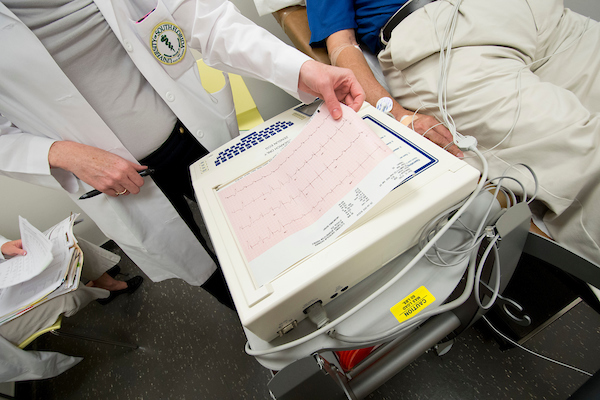
In partnership with Moffitt Cancer Center, Dr. Oliveira said he is also planning to expand cardio-oncology, transitioning from a small program to a full-fledged cardiology service line at Moffitt.
To support these and other areas, several talented faculty members have been successfully recruited, including two key hires he says will bring renowned expertise to the USF Health and TGH programs: the new chief of cardiothoracic surgery, Lucian Lozonschi, MD, whose expertise includes robotic and minimally invasive cardiac surgery, heart transplant and valve surgery, and Hiram Bezerra, MD, PhD, who, in addition to being an internationally recognized interventional cardiologist, brings with him a robust portfolio of clinical trials.
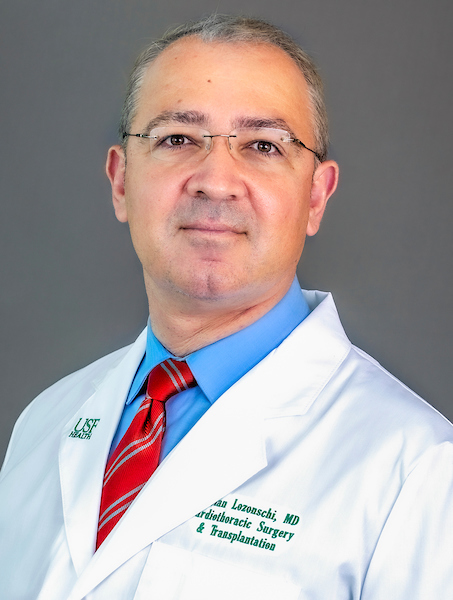
Dr. Lucian Lozonschi
In addition to leading cardiac surgery, Dr. Lozonschi serves as the associate director of HVI. He is also the surgical director of heart transplant and mechanical circulatory support, and associate director of the Transplant Institute.
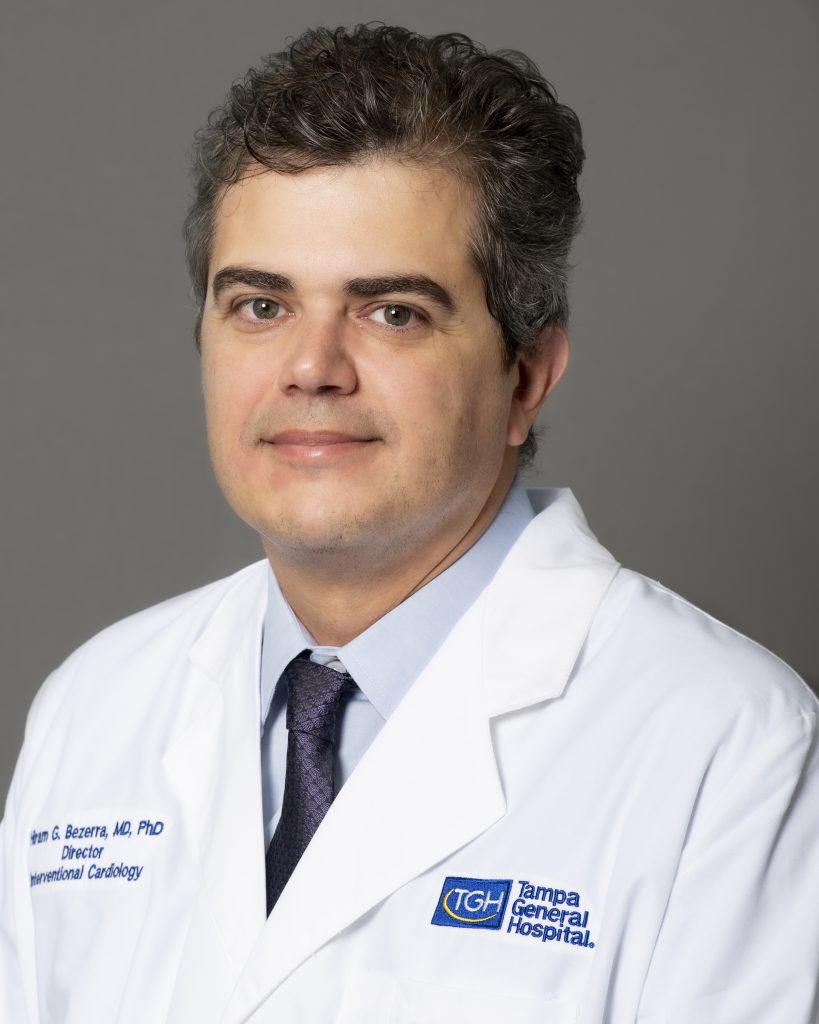
Dr. Hiram Bezerra
And Dr. Bezerra is the section chief of interventional cardiology at USF Health and directs the Interventional Cardiology Center within the HVI. With more than 160 peer-reviewed research articles and memberships at numerous editorial boards and professional committees, Dr. Bezerra brings to USF Health and TGH his research experience in interventional cardiology and optical coherence tomography.
Building a new destination cardiovascular center
The new USF Health/TGH Heart and Vascular Institute is designed to be a destination cardiovascular institute built on the best clinical and scientific expertise available at both USF Health and TGH. It also benefits from collaboration and innovative opportunities provided by organizations outside of the academic medical center, including private practices and biomedical industry.
“Our main goal is to conduct high-impact, disruptive cardiovascular research,†Dr. Oliveira said. “And our collaborative reach will go beyond just TGH and USF Health and stretch well into the greater Tampa Bay area physicians in private practice. Together, we are building an institute that is unparalleled in Florida.â€
The HVI comprises several centers of excellence focusing on core areas of cardiovascular care: cardiac surgery, vascular surgery, interventional, electrophysiology, heart failure, imaging, and prevention. In addition, Dr. Oliveira created centers for education and cardiovascular research, with a quality office that ties all the centers together and ensures world-class outcomes.
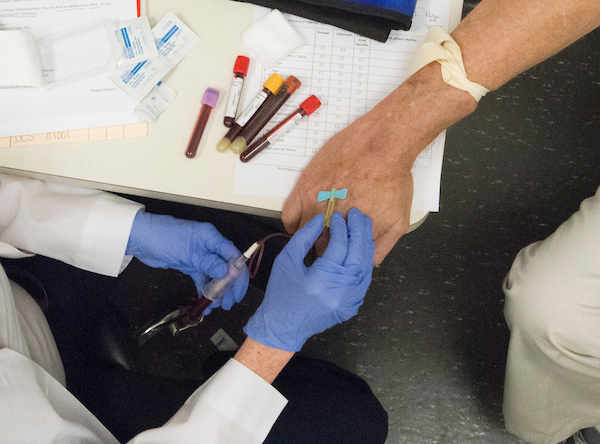
A central advantage of the HVI will be its ambulatory headquarters – within the new Morsani College of Medicine and Heart Institute tower, just opened in January 2020. On the ninth floor of the new building, HVI team members will offer direct patient care for the most complex cardiovascular conditions, which often require a multidisciplinary approach. There, patients can expect to have a wide range of cardiac testing followed by consultations with a multidisciplinary team of cardiologists, pulmonologists, geneticist and surgeons. Because clinical care at the HVI will take place adjacent to the world-class research facilities of USF Health Heart Institute, it will enable conduction of bench-to-bedside science that hopefully will impact cardiovascular disease for generations to come. Added to that is the proximity to TGH, where surgical intervention and transplant programs round out the entire spectrum of patient care.
“This will be a highly integrated, synergistic union of every facet of heart care,†Dr. Oliveira said. “Consider it the trifecta of clinical, translational and basic research within a clinical care setting. In other words, a one-stop shop for superior academic cardiovascular care.â€
]]>